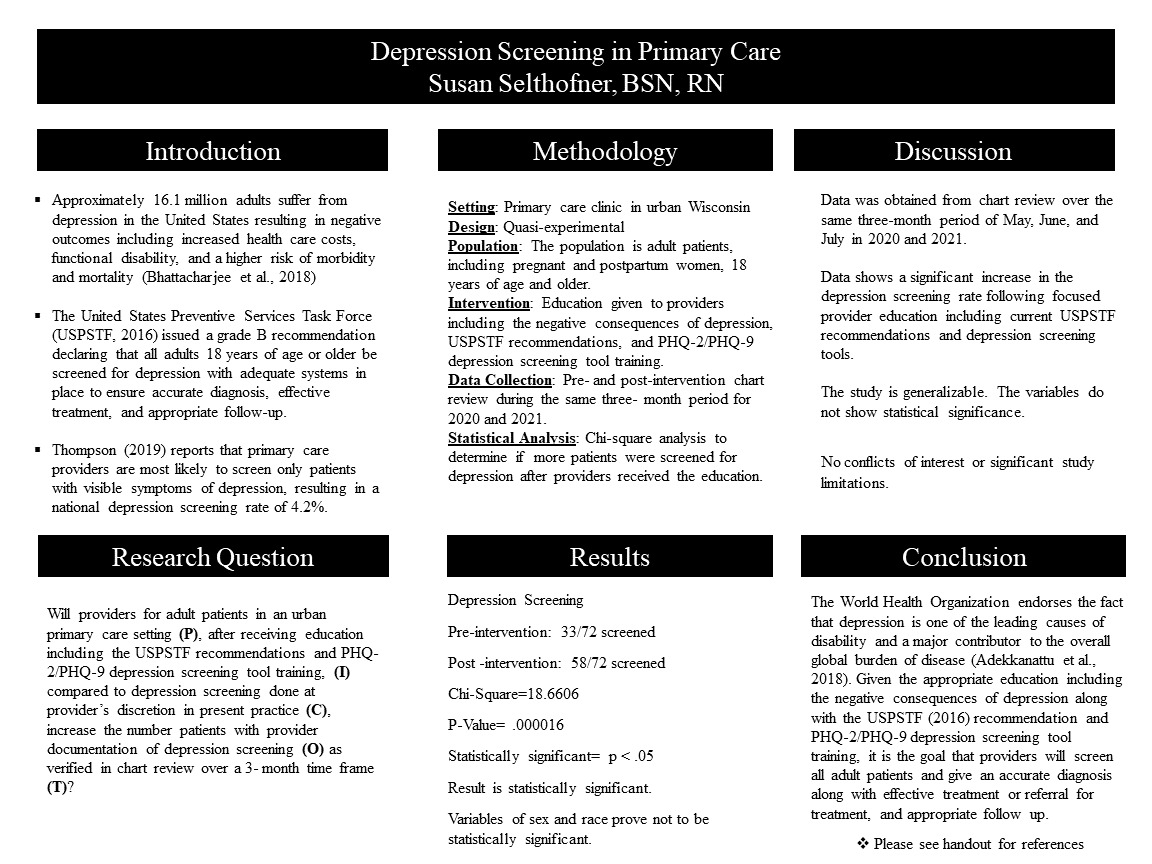PRP023: Depression Screening in Primary Care
Susan Selthofner, BSN, RN, DNP-Student
Abstract
Context:
Adults suffering from depression in the United States experience negative outcomes including increased health care costs, functional disability, and a higher risk of morbidity and mortality. Currently, only a small percentage of adults are screened for depression by their primary care provider, resulting in many people suffering from depression without appropriate treatment. The United States Preventive Services Task Force recommends that all adults 18 years of age or older, including pregnant and postpartum women, be screened for depression with adequate systems in place to ensure accurate diagnosis, effective treatment, and appropriate follow-up.
Objective:
If primary care providers are given education regarding the benefits of screening for depression, along with the appropriate tools for screening with instruction, the depression screening rate will likely dramatically increase creating the catalyst for diagnosis and treatment of depression with many secondary benefits.
Study Design:
The experimental design for this project is a quasi-experimental design.
Setting:
The setting is an urban primary care outpatient clinic.
Population Studied:
Adults, including pregnant and postpartum women, 18 years of age and older, who are fully insured, in an urban primary care outpatient setting. Chart review for 60-70 patients over a 3-month time frame will be completed.
Interventions:
Provider intervention includes education including the negative consequences of depression with USPSTF recommendations and PHQ-2/PHQ-9 depression screening tool training will be given to providers. Patient intervention includes depression screening, a diagnosis of depression, and treatment or referral for treatment if necessary.
Outcome Measures:
All adults will be screened for depression at this outpatient primary care clinic in an urban city in Wisconsin as a routine part of health care.
Anticipated Results:
Screening result will increase from 50% to 100% as part of routine health care.
Outcomes:
Short term outcomes include an increased number of adult patients, including pregnant and postpartum women, who are screened for depression and complete depression screening, and discuss the diagnosis with the provider, accept treatment and/or referral for treatment, and complete referral appointments as verified in chart review.
Adults suffering from depression in the United States experience negative outcomes including increased health care costs, functional disability, and a higher risk of morbidity and mortality. Currently, only a small percentage of adults are screened for depression by their primary care provider, resulting in many people suffering from depression without appropriate treatment. The United States Preventive Services Task Force recommends that all adults 18 years of age or older, including pregnant and postpartum women, be screened for depression with adequate systems in place to ensure accurate diagnosis, effective treatment, and appropriate follow-up.
Objective:
If primary care providers are given education regarding the benefits of screening for depression, along with the appropriate tools for screening with instruction, the depression screening rate will likely dramatically increase creating the catalyst for diagnosis and treatment of depression with many secondary benefits.
Study Design:
The experimental design for this project is a quasi-experimental design.
Setting:
The setting is an urban primary care outpatient clinic.
Population Studied:
Adults, including pregnant and postpartum women, 18 years of age and older, who are fully insured, in an urban primary care outpatient setting. Chart review for 60-70 patients over a 3-month time frame will be completed.
Interventions:
Provider intervention includes education including the negative consequences of depression with USPSTF recommendations and PHQ-2/PHQ-9 depression screening tool training will be given to providers. Patient intervention includes depression screening, a diagnosis of depression, and treatment or referral for treatment if necessary.
Outcome Measures:
All adults will be screened for depression at this outpatient primary care clinic in an urban city in Wisconsin as a routine part of health care.
Anticipated Results:
Screening result will increase from 50% to 100% as part of routine health care.
Outcomes:
Short term outcomes include an increased number of adult patients, including pregnant and postpartum women, who are screened for depression and complete depression screening, and discuss the diagnosis with the provider, accept treatment and/or referral for treatment, and complete referral appointments as verified in chart review.

Jack Westfall
jwestfall@aafp.org 11/21/2021Terrific project. Great poster and abstract. Thanks for sharing at NAPCRG